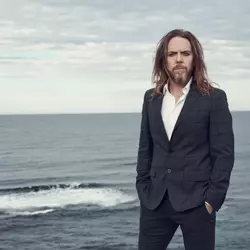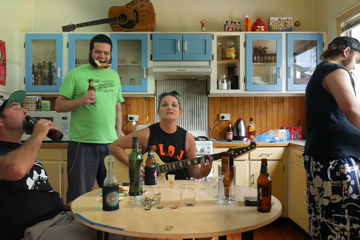 Tim Minchin
Tim MinchinCONTENT WARNING: This article contains discussion of mental health. If you are suffering from any of the issues that have been discussed or need assistance, please contact Lifeline on 13 11 14 or Beyond Blue on 1300 22 4636.
“I think for some reason your family can always make you laugh the most – in my case anyway – probably just because you develop those neurons back when you're young and vulnerable,” writer, performer and musician Tim Minchin says.
That often stupid sense of humour you developed growing up creates a kind of shared vernacular that never goes away. “Now, even though my siblings are idiots, I don't think I ever laugh quite as hard as when we're all being childish.”
The silly side of his sense of humour, which he describes as “pretty immature and guttural”, also short-circuits a learned, adult cynicism. “I think humour as you get older, in our culture, in a post-postmodern way is so ironic. I'm kind of sick of it, actually.
“There's the relief of not having everything dripping with cynical irony when you're with people you knew when you were young.”
Don't miss a beat with our FREE daily newsletter
Minchin does acknowledge that his sense of humour has gotten more cynical, “less innocent and joyous” as he's gotten older, thanks in part to the pressures of his career. But laughing with his siblings – two sisters and a brother – reminds him not to take himself so seriously. “I like being around them, because they remind me not to be [so cynical].”
After his siblings, his wife, Sarah, who he met while studying at the University Of Western Australia, and his uni friends, make him laugh the most. “I met [Sarah] when we were so young and there's this level of silliness and a huge history of shared tiny, little silly jokes. I think that's probably a huge part of what makes relationships work, you know – a shared library of silliness.”
At 19, Minchin sang Lionel Richie’s Hello at a piano bar with such fervour that he literally “bust a gut”. He ended up with a hernia, for which he needed abdominal surgery. A sporty young adult, Minchin says the surgeon had to cut through muscle to fix it.
“I really was in pain,” he says. “The thing that made my stomach hurt the most was if I laughed, and my siblings all knew this.”
The temptation to make their brother laugh at dinner was too much for Minchin’s siblings. “I just remember that whole dinner just crying in pain and laughter because they couldn't help but just deliberately make me laugh. And that's a very strong memory of the pain of wanting not to laugh and not being able to stop.”
Minchin’s relationship with his siblings fed into his most latest project, the Foxtel series Upright. In the show, created by The Chaser’s Chris Taylor, Minchin plays Lucky, a musician travelling across Australia from his home in Sydney to see his dying mother (Heather Mitchell) in Perth. With him he brings an upright piano, a family heirloom, as he braces to confront a fraught past that is revealed to the audience throughout the series.
The series borrows from Minchin’s family history: Lucky and his brother, Toby, played in a band together in their youth; Tim Minchin and his brother, Dan, made music together from the ages of 15 to 25. Minchin says he never found a musical partnership again like he had with Dan.
“I was always going to keep going, and he never was,” Minchin explains. “But Upright's a sort of twisted version of that history where instead of it being a totally loving and amicable separation, if it had been bad and if something had got between my brother and I, what would that be like?”
With the series, which Minchin co-wrote with Taylor, Leon Ford and Kate Mulvany, Minchin wanted to unpack the hypothetical of being exiled from his close-knit family. “I’m so close to my family and I love Perth and I love going home… What would it be like if you were exiled from that in-group and hadn't dealt with the reason for your splitting apart?”
Tim Minchin no longer sees himself as a comedian. “I was a comedian for five years and I've been creating music and stuff for 20. I certainly don't identify as a comedian, but it's a pretty hard label to shake once you've got it.”
He’s no longer interested in deconstructing the “arch” world of comedy, but instead wants to explore the emotional breadth of a story, whether that be his musicals Matilda The Musical and Groundhog Day, his cancelled Aussie DreamWorks movie, Larrikins, or Upright.
"I certainly don't identify as a comedian, but it's a pretty hard label to shake once you've got it.”
“Upright's the perfect example of what I'm trying to do as an artist to heal myself and my viewers of cynicism. I think Upright is profoundly uncynical as a piece of telly. It doesn't try to be ironic.”
What he means by that is that the show doesn’t undercut poignant moments with a wink at the audience. “I want to make people laugh and cry and feel, like they've had a real multi-layered meal,” Minchin says.
It’s something he learned to do working with director Matthew Warchus on Matilda The Musical. Warchus told Minchin: “Stop winking, stop telling the audience not to invest.”
“In so much art and so much comedy,” Minchin continues, “what you're saying is, 'Don't worry. I'm never gonna make you actually care.’
“Until Matilda, I thought the thing I was destined to do was write a Book Of Mormon, to be South Park-y, or whatever. And after Matilda I went, 'No.' I believe I'm able to contribute to work that commits and asks the audience to care. In fact I don't ever want to do anything that doesn't ask the audience to care.”
That extends to moments in his live show, Back, which returns to Australia in March, where he instructs the audience when it is time to “stop laughing and start having the feels”.
Laughing in the face of darkness is, in Minchin’s words, “profoundly important” both in his life and in his work. “You can make people laugh about anything,” Minchin insists.
“I've had jokes about cot death, a lot of jokes about cancer and dying, I had a song called Nothing Can Stop Us Now, which people still play at their weddings when they've got a dark enough sense of humour. Or I Love Jesus. Some of the stuff that I find most painful, like homophobia borne of the church or like child abuse, which I bleakly wrote about in [Come Home] Cardinal Pell, I found ways to laugh at them in a way that I think is cathartic and good for the audience.”
Taken out of the context of a live show, away from the social contract Minchin has with his audience, his lyrics have been dubbed by newspapers as inappropriate.
“Of course it's not appropriate written down in a newspaper – it doesn't work. If I thought it worked written down in a newspaper, I wouldn't bother making it rhyme and singing it. I'd just write it on a blog. But the form and the contract with the audience allows you to say things. So there is a bit of a tension there, because I think it'd be a great pity if culturally we stopped laughing at the things that cause us pain.”
Whether it’s a crash on an intersection in the desert – a moment of happenstance that sees Upright’s Lucky meet his foil, a strong-willed teenager called Meg (Milly Alcock) – or a terrible mistake that hurts your loved ones, “the shit in your life is fertiliser for future flowers”, Minchin says. It’s a cliche, he knows. By understanding that the foundation of your future happiness is in all the dark stuff of your past, Upright is then trying to “find that moment of letting yourself breathe, letting yourself off the hook and forgiving yourself”.
Upright, in one of its darkest – and richest – moments, frankly depicts a family grieving the loss of a brother and son to suicide. Actor Mark Priestley, co-writer Kate Mulvany’s partner, and Minchin’s friend, died by suicide in 2008. “We had a shared bit of shit that we had to plant in,” Minchin says. “In my privileged life, I’ve had my share of lost friends and grief and stuff to tap into.”
Minchin also poured all that he learned about form, character and directing from working on Larrikins into Upright. Larrikins intended to tell the story of a young bilby kicked out of home, who goes on a road trip with a band in the Australian outback. When the project, with its eerie similarities to the series, was canned in early 2017, Minchin described on his blog his “impotent fury and sadness”.
He channelled that feeling, as well as his frustration about Groundhog Day failing to gain traction on Broadway, into Upright. “Without a doubt Upright itself is the flower that came out of the shit of that period in a profound way, in a way that has made total sense of all that,” Minchin says.
Upright airs Sundays on Fox Showcase.















